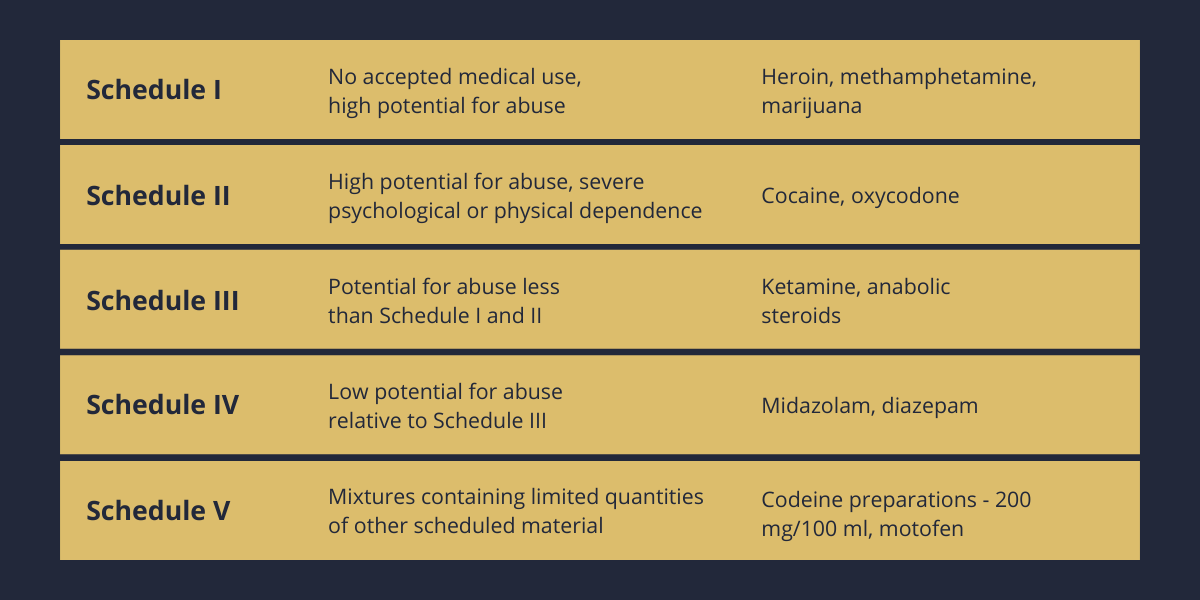
default.html.twig template not found for page: /resources/drug-related-charges/severity-of-drug-laws-in-mnRecent updates to Minnesota drug laws have reduced sentences, increased quantity thresholds, included stricter minimum sentences, and expanded eligibility for statutory stays of adjudication. These changes were approved in order to differentiate addicts from dealers and to keep serious offenders off the streets longer while ensuring that fewer addicts are incarcerated.
The state of Minnesota enforces strict laws over controlled substances. It is illegal to sell or possess a controlled substance without a prescription from a licensed physician. A controlled substance is a drug or chemical whose manufacture, possession, or use is regulated by the government. Typically, these are compounds that have a high potential for serious intoxication or abuse.
If you are caught in possession of or selling controlled substances, the penalties are severe, including jail time. Drugs deemed controlled substances include:
Minnesota divides controlled substances into five schedules. Schedule I consists of the most dangerous drugs associated with the highest probability of abuse and addiction. The other schedules represent drugs that decrease in dangerousness and likelihood of abuse. The classes determine which penalties apply.
Schedule I consists of the most dangerous drugs, which have a high probability of abuse and addiction and no medical value. Schedules II through V decrease in dangerousness and probability of abuse and increase in medical uses.

The severity of penalization depends on the substance, how much is in the offender’s possession, and whether they intend to sell it. Possession is defined as either being on your person or in a place you have control over.
Possession and sale of different controlled substances are sentenced separately because sale is a more severe crime than possession. With the recent changes to Minnesota drug laws, the gap between the sentencing for possession and sale has widened.
If you are caught selling a controlled substance and the prosecution proves that there are aggravating factors present, you will be sentenced to jail for a minimum of 86 months and not more than 40 years, a fine up to $1,000,000, or both.
Aggravating factors include:
First-degree controlled substance crimes are the most serious drug crimes under Minnesota law. A person is guilty of controlled substance crime in the first degree if on one or more occasions within a 90-day period they unlawfully sell or possess the following:
Marijuana or Tetrahydrocannabinols
Amphetamines, Phencyclidines or Hallucinogens
Cocaine or Methamphetamines
Heroin
"Other" narcotics
25 kilograms or more of marijuana or THC
A person convicted of a first degree controlled substance charge is guilty of a felony.
A person is guilty of aggravated controlled substance in the first degree if they sell or possess 100+ grams or 500+ dosage units of the controlled substance at issue and:
A person is guilty of controlled substance crime in the second degree if on one or more occasions within a 90-day period they unlawfully sell or possess the following:
Marijuana or Tetrahydrocannabinols
Amphetamines, Phencyclidines or Hallucinogens
Cocaine or Methamphetamines
Heroin
“Other” narcotics
A person is also guilty of a controlled substance crime in the second degree if they sell any amount of a Schedule I or II narcotic drug either to a person under 18 or in a school zone, park, public housing zone, or drug treatment facility.
A person is guilty of controlled substance crime in the third degree if on one or more occasions within a 90-day period they unlawfully sell or possess the following:
Marijuana or Tetrahydrocannabinols
Amphetamines, Phencyclidines or Hallucinogens
Cocaine or Methamphetamines
Heroin
Schedule I, II, or III drug (except Schedule I or II narcotic drug)
Schedule I or II narcotic drug
“Other” narcotics
A person is guilty of controlled substance crime in the fourth degree if they unlawfully sell or possess the following:
Marijuana or Tetrahydrocannabinols
Hallucinogen
Schedule I, II, or III drug (except marijuana)
Schedule IV or V drug
A person is guilty of controlled substance crime in the fifth degree if they unlawfully sell or possess the following:
Marijuana or Tetrahydrocannabinols
Schedule I, II, or III drug
Schedule IV drug
The offender may also be charged if they procure, attempt to procure, possess, or have control over a controlled substance by any of the following means:
.png)
Possession of a precursor drug with the intent to manufacture methamphetamine is a felony. The penalty is up to ten years imprisonment, a fine up to $20,000, or both. If the person has a previous conviction, the penalty is up to 15 years imprisonment, a fine up to $30,000, or both.
The Minnesota Sentencing Guidelines recommend an 18-month sentence for a person with no criminal history.
Special laws are in place to protect children and vulnerable adults from methamphetamine. Causing a child or vulnerable adult to inhale, have contact with, or ingest methamphetamine is a felony. It's also a felony to manufacture methamphetamine or store precursors, waste products, or paraphernalia in the following places:
Violators are subject to a sentence of up to five years imprisonment, a fine up to $10,000, or both.
The Minnesota Sentencing Guidelines recommend a 12-month sentence for a person with no criminal history.
The potential penalties in Minnesota for possessing drugs are very serious. If you're facing a drug offense in Minnesota, contact a criminal defense attorney. A controlled substance conviction can subject you to fines and incarceration. A defense lawyer will review the facts of your case to determine possible defenses. They can make sure that you're aware of the consequences so that you can make an informed decision.